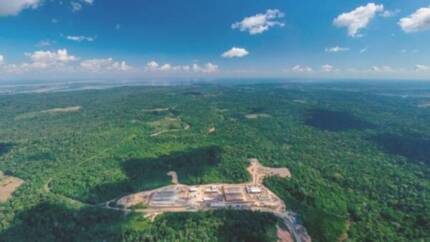
On Monday, March 25, the Resistência Amazônica (Amazon Resists) Network is releasing a report that reveals the irregularities and impacts of the operations of the Brazilian fossil fuel company Eneva in the Azulão Field, a site of fossil gas extraction located in the heart of the Amazon Basin in the municipality of Silves, in the southern part of the state of Amazonas, Brazil.
The main findings of the report include:
- Eneva is operating irregularly in the Azulão field because it has not adhered to the proper environmental licensing process.
- The extraction of fossil gas at the site is harmful to Indigenous peoples who have lived for decades in the area affected by the project, as it impacts the region’s fauna, affects the communities’ way of life, and creates uncertainty regarding public health impacts.
- Indigenous groups in voluntary isolation may be affected by Eneva’s activities. A previously unpublished photographic record in the report supports findings by experts from the Pastoral da Terra (Pastoral Land) Commission, published about three months ago, regarding the presence of these groups in the area.
- The environmental impacts are significant and could include deforestation, reduction in biodiversity, damage to air quality from exhaust emissions, and potential contamination of rivers and aquifers by chemicals used in the industrial process, which would affect a much larger area than just the vicinity of the project.
- The region boasts significant potential for generating energy from renewable sources with lower environmental and climate impacts, such as solar power, eliminating the need to depend on the costlier and more polluting option of fossil fuels for its energy supply.
- Due to the irregularities and impacts of Eneva’s project, the organizations are reinforcing their request, currently under review by the Federal Court of Amazonas, to halt the company’s activities in the area. They further argue that any new licensing for fossil fuel extraction in the Azulão Field should fall under the jurisdiction of the Brazilian Institute of Environment and Renewable Natural Resources (IBAMA), not the Amazonas Environmental Protection Institute (IPAAM), and must include appropriate prior, free, informed, and good faith consultation with the Indigenous Peoples affected.
About the report
The survey is the outcome of two years of collaborative work by Indigenous and community leaders, academics, NGOs, and activists comprising the Amazon Resists Network. It draws on testimonies from Indigenous leaders in the region, structured interviews with residents of traditional communities, and visits to sites near the drilling structures and areas identified by the community as most affected, to verify the socio-environmental conditions in loco.
By compiling and organizing an unprecedented amount of information on the damage caused by Eneva’s operations, the report reinforces the argument that the environmental licensing for the Azulão Field is irregular and should be suspended by the government—a demand made by civil society organizations since last year.
On May 17, 2023, the Association for the Environmental Preservation of Silves (ASPAC) and the municipality’s Indigenous communities, with support from 350.org, Grupo de Trabalho Amazônico (GTA [Amazon Working Group]), and the Pastoral Land Comission (CPT), filed a Public-Interest Civil Action (ACP 1021269-13.2023.4.01.3200) to request the cancellation of the project’s environmental license and a change jurisdiction—from the state to the federal government—for any new licensing application.
On May 19, 2023, the Federal Court of Amazonas, as an injunction, suspended Eneva’s environmental licenses for operation and installation in the Azulão Field, which had been issued irregularly by the state’s environmental agency, the Amazonas Environmental Protection Institute (IPAAM). Subsequently, the company managed to overturn the decision in court, and since then the case has been pending before the 7th Federal Environmental and Agrarian Court – Judicial Section of the State of Amazonas. The merits of the lawsuit are still under appreciation.
About the Amazon Resists Network
The Amazon Resists Network was established in 2020 to enhance the efforts of community leaders, activists, and civil society organizations toward an Amazon region free from oil and gas extraction, embodying climate justice, and powered by renewable energies produced in a socio-environmentally responsible manner.
The network comprises the following organizations: 350.org, Alternativa Terrazul, Associação pela Preservação Ambiental de Silves (ASPAC), Comissão Pastoral da Terra (CPT), Grupo de Trabalho Amazônico (GTA), and Instituto de Pesquisa e Desenvolvimento Amazônico (IPDA).
The post Fossil gas extraction in Amazonas is irregular, damaging to the environment, and harmful to Indigenous peoples appeared first on 350.